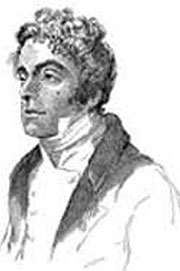William Burchell
William John Burchell is regarded as one of the greatest of the early African explorers. He was an accomplished naturalist, who amassed vast natural history collections and described many new species. His achievements were not fully recognised by his contemporaries and he became a solitary and unhappy figure in later life.

His early years
Burchell was born in 1782, the eldest son of a wealthy nurseryman. He developed an interest in natural history early on in life and was particularly taken with botany, which he studied at Kew Gardens. In his mid twenties Burchell took up the position of schoolmaster and acting botanist on the island of St Helena. His fiancée set out to join him in 1807, however, upon arrival she announced a change of heart; she was to marry the captain of the ship that had carried her to the island, and Burchell was to remain a bachelor until his death in 1863.
Burchell's first expedition
In 1810, Burchell embarked upon his first expedition, which he documented in his two-volume work Travels in the interior of southern Africa. He returned to England in 1815 with over 50,000 specimens, many of which he donated to the British Museum, Natural History (now known as the Natural History Museum, London). Unfortunately, many of these specimens were damaged whilst in storage at the British Museum. This led to a dispute between Burchell and the London museum's authorities, with much resentment on both sides. Following this quarrel, the keeper of the collections named Burchell's zebra Asinus burchelli (Asinus is from the Latin, meaning ass or fool).
Burchell's second expedition and later years
Burchell set out upon his second expedition in 1825. This time he travelled in eastern Brazil, where again, he collected vast numbers of specimens including over 16,000 insects, 817 birds skins of 362 species, and many plants and other animals. In 1830, Burchell returned to Britain and in 1834 was awarded an honorary doctorate by Oxford University in recognition of his work. However, his travels had exhausted his personal fortune and he gradually became an isolated and disillusioned figure. In 1863 Burchell took his own life.
Burchell's collections at the Museum
In 1865, two years after his death, Miss Anna Burchell presented the bulk of her brother's entomological, ethnological, geological and zoological material to the newly open University Museum. Many of Burchell's bird and mammal types were included in this donation and survive to this day. This collection comprises specimens collected in South Africa in 1810-1815, Portugal and Tenerife in 1825 and eastern Brazil 1825-1830. His botanical specimens and manuscripts were given to the Kew Museum. To find out more about Burchell's specimens in the zoological collections, search under "Burchell" in the zoology online databases.
Zoology collections homepage
Zoology databases
Selected references
Burchell, W.J. (1819) Hints on emigration to the Cape of Good Hope. London.
Burchell, W.J. (1822) Travels in the interior of southern Africa. Volume 1. Longman, Hurst, Rees, Orme and Brown. London.
Burchell, W.J. (1824) Travels in the interior of southern Africa. Volume 2. Longman, Hurst, Rees, Orme and Brown. London.
Cleverly, L. (1989) W.J.Burchell: special agent or naturalist? [a short biography]. Edenvale: S.A.
Pickering, J. (1998) William John Burchell's travels in Brazil, 1825-1830, with details of the surviving mammal and bird collections. Annals of Natural History 25 (2), 237-265 (June 1998).
This article is also available as a fully illustrated PDF
Learning more ... William Burchell (PDF, 162kB)
To read this file you will need to download Adobe Reader
Learning more articles are free to all users for educational, non-profit purposes.
